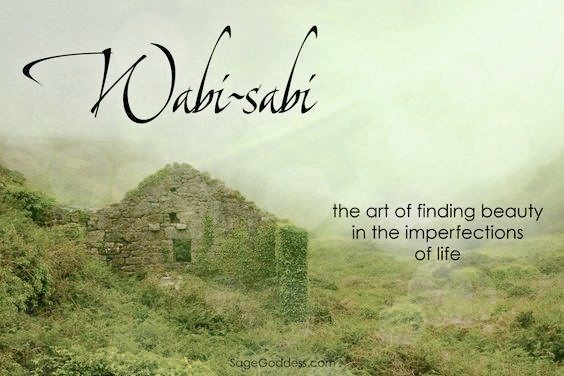I am drawn to old architectural pieces. Windows, doors, mantels, shutters, and even doorknobs. Humble as they are, these items hold for me a richness and history, and I love that they each carry within them a story or two…
If the paint is crackled and chippy, it only enhances the beauty for me. When I lived in northern Calif. I would frequent the salvage yards in Berkeley, reclaiming and re-purposing forgotten treasures that have a rich history. Their imperfections are to me what make them wonderful, interesting, and beautiful.
The Japanese have a comprehensive world view they call “Wabi-Sabi” (侘寂?). The aesthetic is centered on the acceptance of transience and imperfection. It is sometimes described as a beauty that is “imperfect, impermanent, and incomplete.”
I often find that It is easy for me to become critical and judgmental of imperfections in myself and in others. But the reality is that wrinkles mean you lived life, and learned.
Dirty dishes mean there was food on the table.
A scar is a reminder of survival.
A spelling mistake reminds us of humanity.
A broken heart is a heart that has loved and cared deeply.
These things are beautiful. Old things, worn things, simple things, busted-up things. Imperfect things.
Wabi Sabi:
Nothing lasts.
Nothing is finished.
Nothing is perfect.
It is an art and way of life finding beauty in the imperfections, in the mutability of things. It accepts change and decay and even brokenness, seeing in these evidence of life’s journey. We live in the tension of permanence and impermanence, at any time a breath away from death. And on that path of this journey of faith, we have much to learn from both beauty and imperfections.
Flaws are the leveling field of humanity.
We all have them, rich and poor alike. It is our blemishes that connect us with our humanness.
Poets have written about life’s inevitable orders to break us all and the resulting strengths that calcify at our broken places (Ernest Hemingway). How the light comes through our cracks (Leonard Cohen). How imperfection inspires the spark of creation and imagination (Jhumpa Lahiri). Even the imperfect physical objects surrounding us can become symbols of our diligence to find meaning. Beauty can be a reflection of the human virtues of those who made them or own them. Perhaps this is why the shabby vest knitted by grandma or the scribbled love letters from our children or the broken seashell from an old friend can turn into our dearest treasures. Because despite their imperfections, these objects become beacons of our humanity: our ability to feel, to empathize, to connect, to love.
May we learn to find wholeness in our imperfections, and in the imperfections of others.
